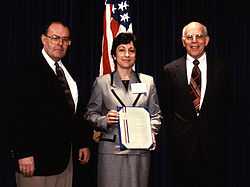John H. Gibbons
- For other perons named John Gibbons see John Gibbons (disambiguation)
| John Howard Gibbons | |
|---|---|
|
Dr. John Gibbons (right) | |
| Born |
1929 Harrisonburg, VA |
| Citizenship | American |
| Fields | Physics |
| Alma mater | Randolph-Macon College & Duke University |
| Known for | Assistant to the President for Science and Technology and Director of the White House Office of Science and Technology Policy |
John Howard "Jack" Gibbons (born January 15, 1929) is an American scientist. Between 1993 and 1998 he served as the Assistant to the President for Science and Technology and Director of the White House Office of Science and Technology Policy.
Biography
Gibbons was born in Harrisonburg, Virginia, in 1929. He received a bachelor's degree in mathematics and chemistry from Randolph-Macon College in 1949 and a doctorate in physics from Duke University in 1954.
Career
Following his formal training in physics, he spent the next 15 years at Oak Ridge National Laboratory. At Oak Ridge, Gibbons studied the structure of atomic nuclei, with emphasis on the role of neutron capture in the nucleosynthesis of heavy elements in stars. In the late 1960s, at the urging of Alvin M. Weinberg, he pioneered studies on how to use technology to conserve energy and minimize the environmental impacts of energy production and consumption. In 1973, Gibbons was appointed the first director of the Federal Office of Energy Conservation.
Two years later he returned to Tennessee to direct the University of Tennessee Energy, Environment and Resources Center. In 1979, he returned to Washington to direct the Congressional Office of Technology Assessment which provided Congress with nonpartisan, comprehensive analyses on a broad spectrum of issues involving technology and public policy where his tenure lasted over two six-year terms prior to his Presidential appointment as Science Advisor on February 2, 1993.
After leaving the White House, Dr. Gibbons served as the Karl T. Compton Lecturer at MIT (1998–1999) and Senior Fellow at the National Academy of Engineering (1999–2000) where he assisted NAE’s president on a variety of topics including the new NAE program in Earth Systems Engineering. During 1999-2001 he was Senior Advisor to the U.S. Department of State where he assisted the Secretary in revitalizing science and technology capabilities, including creating the position of Science Advisor to the Secretary. From 2000-2001 he was the elected President of Sigma Xi, The Scientific Research Society.
Scientific affiliations and awards
Dr. Gibbons is a fellow of the American Physical Society and the American Association for the Advancement of Science (AAAS) and was elected to membership in the National Academy of Engineering. He was awarded the AAAS Philip Hauge Abelson Prize for sustained exceptional contributions to advancing science; the Leo Szilard Award for Physics in the Public Interest from the American Physical Society; and medals from the German and French governments for fostering scientific cooperation. Gibbons has over 50 publications on energy and environmental policy.[1]
In 2004 he became one of the founding members and serves on the Board of Directors of Scientists and Engineers for America, a 501(c)(3) organization focused on promoting sound science in American government. He was also a member of the Council on Foreign Relations and the Federation of American Scientists.
External links
References
- ↑ Malcolm H. Browne (1992-12-25). "The Transition: Physician and Physicist; Dr. John H. Gibbons -- Science Adviser". New York Times. Retrieved 2007-10-26.
|
